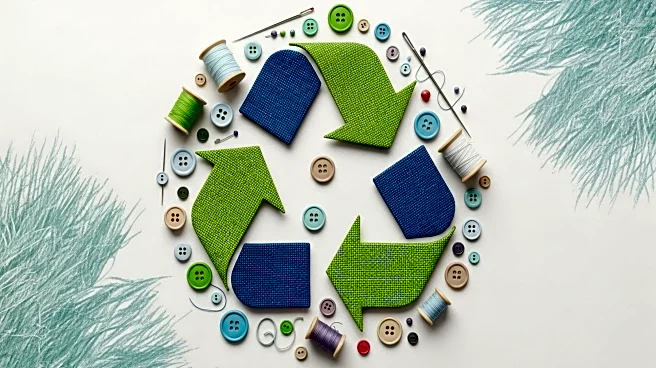What's Happening?
The European Circular Textile Coalition, comprising eleven European textile companies, is advocating for the European Union to enhance its recycling policies. The coalition emphasizes the need for the EU to align its regulatory ambitions with investments in recycling and production systems. The coalition's manifesto calls for leveraging post-consumer recycled textiles to create green jobs, foster textile industry innovation, and improve competitive positioning. The coalition highlights the current challenge where only one percent of Europe's 12.6 million tonnes of textile waste is recycled into new clothing, with the majority being landfilled, incinerated, or exported. To address this, the coalition proposes three policy principles: nearshoring production to ensure a competitive European textile chain, prioritizing high-quality textile-to-textile recycling using post-consumer recycled textile waste, and mandating the use of recycled fibers in textiles with ambitious targets.
Why It's Important?
The coalition's initiative is significant as it aims to transform the textile industry by promoting sustainable practices and reducing environmental impact. By advocating for robust recycling policies, the coalition seeks to create green jobs and drive innovation within the industry. This move could potentially enhance the EU's competitive position in the global textile market. The emphasis on using post-consumer recycled textiles as a primary raw material could lead to a substantial reduction in textile waste, contributing to environmental sustainability. The coalition's call for binding agreements highlights the urgency of transitioning to a circular economy, which could have long-term benefits for both the environment and the economy.
What's Next?
The European Circular Textile Coalition plans to engage other players in the textile value chain and initiate discussions with policymakers to implement their manifesto. The coalition stresses the need for binding agreements to increase demand for recycled materials, indicating that voluntary efforts have been insufficient. The coalition's proactive stance suggests that significant policy changes could be on the horizon, potentially leading to increased investment in recycling infrastructure and a shift towards more sustainable textile production practices.
Beyond the Headlines
The coalition's efforts could trigger broader changes in the textile industry, encouraging companies to adopt more sustainable practices and invest in recycling technologies. This shift could also influence consumer behavior, as increased availability of recycled textiles may lead to greater demand for sustainable fashion. Additionally, the coalition's focus on nearshoring production could impact global supply chains, potentially leading to more localized and efficient manufacturing processes.









